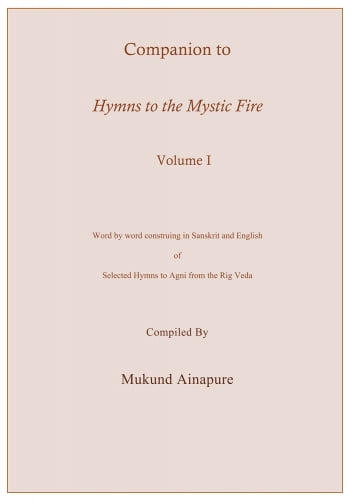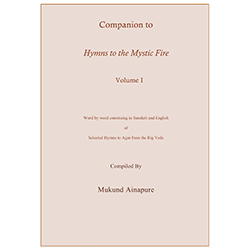Companion to “Hymns to the Mystic Fire” (Vol.1) by Mukund Ainapure

Companion to Hymns to the Mystic Fire
Volume I
Companion to Hymns to the Mystic Fire is meant as an aid to the systematic study of Hymns to the Mystic Fire (CWSA Volume 16) for those interested in Sri Aurobindo’s mystical interpretation of the Veda.
It provides the original Sanskrit verses (Riks) from the Rig Veda, in Devanagari (without accents), translated and cited by Sri Aurobindo in Hymns to the Mystic Fire. The compiler has provided the Padpātha under each verse (in Devanagari as well as Roman Transliteration) in which all euphonic combinations (sandhi) are resolved into the original and separate words and even the components of compound words (samās) indicated; and matched each Sanskrit word in the verse with the corresponding English word in the Translation using superscripts. The footnotes provide alternative meaning(s) of a word with comments based on Sri Aurobindo’s writings.
In the Foreword to the first edition of Hymns to the Mystic Fire, (1946) Sri Aurobindo stated that “.…to establish on a scholastic basis the conclusions of the hypothesis (mystical interpretation) it would have been necessary to prepare an edition of the Rig-veda or of a large part of it with a word by word construing in Sanskrit and English, notes explanatory of the important points..” This compilation series is a humble attempt in providing such ‘word by word construing in Sanskrit and English’ of selected verses of the Rig Veda with explanotary notes. Earlier publications (Companion to The Secret of the Veda – Volume I & II) covered the entire Volume 15 – The Secret of the Veda. This publication covers verses from Part I of Volume 16 – Hymns to the Mystic Fire.
Sri Aurobindo has said that – Throughout the Veda it is in the hymns which celebrate this strong and brilliant deity (Agni) that we find those which are the most splendid in poetic colouring, profound in psychological suggestion and sublime in their mystic intoxication (The Secret of the Veda, Vol.15 p.390). Hope the following pages provide a glimpse of the splendid, the profound and the sublime in these mystic hymns to this brilliant deity.
Book Details
Author: Mukund Ainapure
Print Length: 190
Publisher: Self
Original source:
Submitted by: Mukund Ainapure
Book format: Pdf, ePub, Kindle
Language: English
Book Download
Contents
- PROLOGUE
- RIGVEDA
- AGNI, THE ILLUMINED WILL
- AGNI, THE DIVINE WILL-FORCE
- PART ONE. HYMNS TO THE MYSTIC FIRE
- HYMNS OF GRITSAMADA. MANDALA TWO
- Sukta 1
- Sukta 2
- Sukta 3
- Sukta 4
- Sukta 5
- Sukta 6
- Sukta 7
- Sukta 8
- Sukta 9
- Sukta 10
- HYMNS OF BHARDWAJA. MANDALA SIX
- Sukta 1
- Sukta 2
- Sukta 3
- Sukta 4
- Sukta 5
- Sukta 6
- Sukta 7
- Sukta 8
- Sukta 9
- Sukta 10
- Sukta 11
- Sukta 12
- Sukta 13
- Sukta 14
- Sukta 15
- Sukta 16
- HYMNS OF PARASHARA. MANDALA ONE
- Sukta 65
- Sukta 66
- Sukta 67
- Sukta 68
- Sukta 69
- Sukta 70
- Sukta 71
- Sukta 72
- Sukta 73
- HYMN OF PARUCHCHHEPA. MANDALA ONE
- Sukta 127
- GLOSSARY
Sample
Companion to Hymns to the Mystic Fire – Volume I
Agni, the Illumined Will
Agni is the most important, the most universal of the Vedic gods.
In the physical world he is the general devourer and enjoyer. He is also the purifier; when he devours and enjoys, then also he purifies. He is the fire that prepares and perfects; he is also the fire that assimilates and the heat of energy that forms. He is the heat of life and creates the sap, the rasa in things, the essence of their substantial being and the essence of their delight.
He is equally the Will in Prana, the dynamic Life-energy, and in that energy performs the same functions. Devouring and enjoying, purifying, preparing, assimilating, forming, he rises upwards always and transfigures his powers into the Maruts, the energies of Mind. Our passions and obscure emotions are the smoke of Agni’s burning. All our nervous forces are assured of their action only by his support.
If he is the Will in our nervous being and purifies it by action, he is also the Will in the mind and clarifies it by aspiration. He leads the thoughts towards effective power; he leads the active energies towards light.
His divine birth-place and home, though he is born everywhere and dwells in all things, is the Truth, the Infinity, the vast cosmic Intelligence in which Knowledge and Force are unified. For there all Will is in harmony with the truth of things and therefore effective; all thought part of Wisdom, which is the divine Law, and therefore perfectly regulative of a divine action. Agni fulfilled becomes mighty in his own home in the Truth, the Right, the Vast. It is thither that he is leading upward the aspiration in humanity, the soul of the Aryan, the head of the cosmic sacrifice.
The Vedic sacrifice is, psychologically, a symbol of cosmic and individual activity become self-conscious, enlightened and aware of its goal. The whole process of the universe is in its very nature a sacrifice, voluntary or involuntary. Self-fulfilment by self-immolation, to grow by giving is the universal law. It is only when the law is recognised and voluntarily accepted that this kingdom of death can be overpassed and by the works of sacrifice Immortality made possible and attained. All the powers and potentialities of the human life are offered up, in the symbol of a sacrifice, to the divine Life in the Cosmos.
Knowledge, Force and Delight are the three powers of the divine Life; thought and its formations, will and its works, love and its harmonisings are the corresponding human activities which have to be exalted to the divine level. The dualities of truth and falsehood, light and darkness, conceptional right and wrong are the confusions of knowledge born of egoistic division; the dualities of egoistic love and hatred, joy and grief, pleasure and pain are the confusions of Love, perversities of Ananda; the dualities of strength and weakness, sin and virtue, action and inaction are the confusions of will, dissipators of the divine Force. And all these confusions arise and even become necessary modes of our action because the triune powers of the divine Life are divorced from each other, Knowledge from Strength, Love from both, by the Ignorance which divides. It is the Ignorance, the dominant cosmic Falsehood that has to be removed. Through the Truth, then, lies the road to the true harmony, the consummated felicity, the ultimate fulfilment of love in the divine Delight. Therefore, only when the Will in man becomes divine and possessed of the Truth, amṛto ṛtāvā, can the perfection towards which we move be realised in humanity.
The sacrifice is essentially an arrangement, a distribution of the human activities and enjoyments among the different cosmic Powers to whose province they by right belong. Therefore the hymns repeatedly speak of the portions of the gods. It is the problem of the right arrangement and distribution of his works that presents itself to the sacrificer; for the sacrifice must be always according to the Law and the divine ordainment (ṛtu, the later vidhi). The will to right arrangement is an all-important preparation for the reign of the supreme Law and Truth in the mortal.
The solution of the problem depends on right realisation, and right realisation starts from the right illuminative Word, expression of the inspired Thought which is sent to the seer out of the Vast. The Word must be accepted by other divine Powers, that is, it must bring out some potentiality in the nature or bring into it some light of realisation by which the divine Workers may be induced to manifest in the superficial consciousness of humanity and embrace openly their respective functions. And it must be illuminative of the double nature of Agni, this Lord of the lustrous flame. Agni is a Light as well as a Force.
…


Leave a Reply
Want to join the discussion?Feel free to contribute!